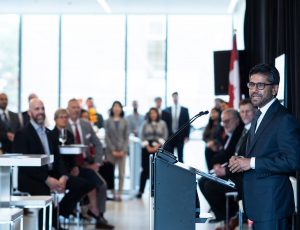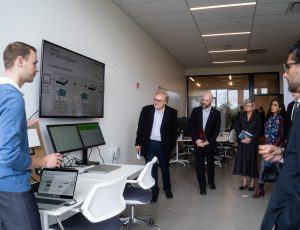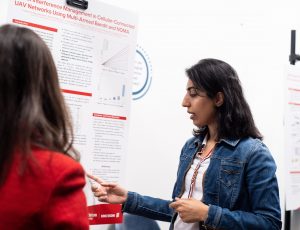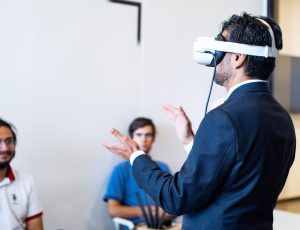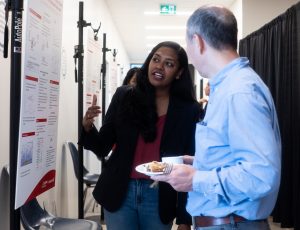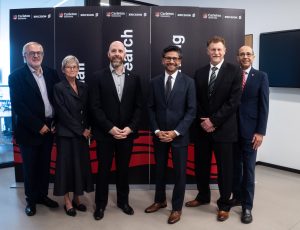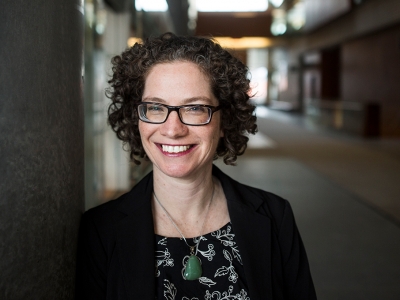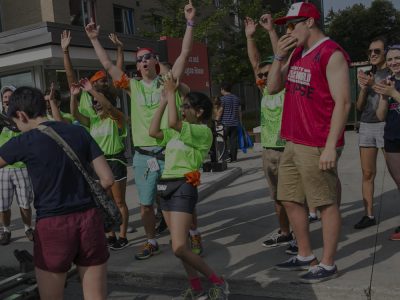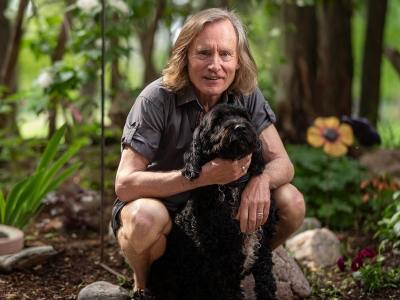By Jena Lynde-Smith
Photos by Lindsay Ralph
On Sept. 28, more than 75 Carleton University community members, government officials and industry representatives gathered to mark the official opening of the Ericsson-Carleton Mobile Wireless Lab in Carleton’s ARISE building. The lab is a part of the existing Ericsson partnership created to expand experiential learning and research in wireless communications.
A first of its kind in Canada, the lab hosts a private standalone 5G network that will allow graduate students and researchers to develop, test and optimize state-of-the-art applications.
“It’s a shining example of what can be accomplished when universities and industries work together with shared values and common goals,” said Carleton President and Vice-Chancellor, Benoit-Antoine Bacon, at the unveiling.
Rafik Goubran, Carleton’s Vice President of Research and International, provided opening remarks at the event.
“We’re excited to be launching the Ericsson-Carleton Mobile Wireless Lab and are proud of our partnership with Ericsson,” he said.
“The lab will play a significant role in development and dissemination of interdisciplinary research. Through the establishment of the Ericsson Chair in 5G wireless research, student fellowships, educational courses, and research projects – we are building the next generation of talent in this field in Canada.”
Since its launch in 2020, the Carleton and Ericsson partnership has achieved considerable success. With total funding greater than $5 million, the collaboration has supported many research projects, created graduate student internships, instituted a research chair position, and established a prestigious Ericsson Fellowship program, which has 7 current fellows and 33 graduates to date. Over 400 co-op work terms have been completed by Carleton students, and over 50 graduate students at both Carleton and the University of Ottawa have completed the 5G Networks graduate course, which is led by faculty and industry experts from Ericsson.
Yasir Naqvi, MP for Ottawa Centre, spoke to the importance of fostering exceptional talent. The federal government, through the Natural Sciences and Engineering Research Council (NSERC), contributed $2 million dollars to the partnership.
“Canada’s competitive advantage is our people,” Naqvi said. “We are one of the desired points of destination across the world. We need to make sure we’re giving all of those people an opportunity to succeed and excel. That’s what universities like Carleton and companies like Ericsson are able to do”
Carleton University and Ericsson have also developed a joint training program for researchers and information technology personnel on campus, enabling the effective management of the 5G lab.
“This lab is a platform for innovation,” said Marcos Cavaletti, head of the Ottawa site for Ericsson.
Researchers in Carleton’s Department of System and Computer Engineering and School of Computer Science are ready to hit the ground running in the new lab. Many are already conducting studies in areas like machine learning, drone navigation, robotics, immersive virtual reality and localization.
Ioannis Lambadaris, the Ericsson Chair in 5G Wireless Research, gave an example of what 5G research can do during his speech.
“The 5G network in a lab building can map the layout of the building and become a precision GPS system, which can guide first responders into buildings,” he said of the technology which could help locate people in busy places like stadiums and airports.
Following speeches, attendees of the event had the opportunity to tour the facility, watch demonstrations, and listen to presentations from students conducting research.
Bacon closed his remarks by thanking the many supporters, partners and funders of the Carleton-Ericsson collaboration.
“Our partnership with Ericsson offers tremendous benefits for everyone involved,” he said.
“As we continue to develop transformative 5G technology and train the next generation in wireless communications, I am confident that our collaboration with Ericsson will set the standard in industry-academic partnerships.”
Friday, September 30, 2022 in Computer Science, Engineering, Government, Partnerships, Research, Technology
Share: Twitter, Facebook
